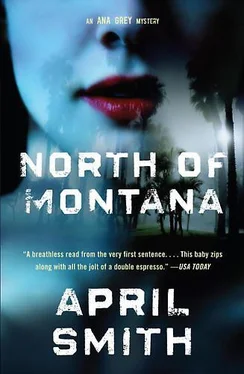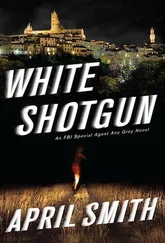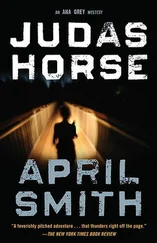The woman puts the baby back in the crib, opens a drawer in a wood-grained cardboard dresser, and removes a small black Bible stuffed with folded papers. She removes the rubber bands that hold it all together, carefully rolling them over her wrist so they won’t be lost, takes out a white business card, and gives it to me.
“This is why I know it is true.”
The card bears a gold seal and in discreet black type: FEDERAL BUREAU OF INVESTIGATION, Ana Grey, Special Agent, along with our Wilshire office address and phone number.
“There are a hundred ways she could have gotten my card.”
Mrs. Gutiérrez points with a bronze-red nail. “Look on the other side.”
Turning it over I see the words “Immigration and Naturalization Service, 300 North Los Angeles St., 213-894-2119,” written in my own hand.
“You gave this to Violeta when she first came to this country.”
“I honestly don’t remember.”
“It was seven years ago.”
Mrs. Gutiérrez folds her hands over her stomach and rocks back with a satisfied nod.
It could have been that when I was a rookie agent on desk duty a young Latina came tremulously to the FBI in the big skyscraper. Possibly she couldn’t speak English (animated now in imagination, a peasant girl, humble, a mass of black hair) and I slipped information on the U.S. Immigration Service to her through the slot, condescendingly, impatiently telling her to try somewhere else, too pumped up about the real challenges at the Bureau that lay ahead of me to listen or care what another confused immigrant was babbling about in Spanish, as she backed away in frustration from the double wall of bulletproof glass that protects us from the public.
The card that I hold in my hand seems to be evidence that we did once meet. I wonder if it could have happened that way, if my arrogance somehow caused a young woman to take a path that eventually led to crossfire and contorted dying.
Slipping the card into my jacket pocket, “How are we supposed to be related?”
“She told me once you are cousins through your father.”
“I don’t know a lot about my father’s side of the family.”
“I will show you.”
Mrs. Gutiérrez wets her lips and shuffles through the papers, holding them at arm’s length and squinting.
“This is Violeta’s mother, Constanza. Probably she is your aunt.”
In the snapshot a middle-aged woman is standing alone in a cleared area that seems surrounded by luxuriant overgrowth. She has shapeless black hair and there is darkness under the eyes, but she is smiling warmly. She wears a black and white dress with pale orange blossoms and no shoes and is holding a baby.
“This is the house where Violeta grew up.”
It looks more like the unfinished frame of a house to me, made of bamboo sticks, cloth, and leaves with no roof or walls. There are pictures of Violeta’s brothers — more alleged cousins — husking corn, and a dim shot of a parrot in a palm tree, the colors faded to a uniform, dull aqua.
I shake my head. None of it makes sense.
“The police think Violeta was involved with drugs.”
“That is wrong.” Mrs. Gutiérrez looks straight at me with clear brown eyes.
“They think that’s why she was killed.”
“The police are crazy. I know Violeta. She was afraid of the drugs. She didn’t want her children to grow up with the drugs and the gangs, that is why she was saving money to go back to El Salvador. She was a good person,” Mrs. Gutiérrez insists, eyes swelled now with tears. “She loved her children. In our country there was a war, but she came all the way to the United States to be shot down in the street.”
She holds the cigarette under running water in the sink until it turns a sickly gray, then tosses it angrily into a metal garbage can.
‘Where did she work?”
“She was a housekeeper for a lady in Santa Monica. That lady owed her a lot of money.”
“What is a lot of money?”
“Maybe …” Mrs. Gutiérrez puts a fist on her hip and looks toward the cottage cheese ceiling. “Four hundred dollars. Violeta was very unhappy. The lady was mean and she fired her.”
“Why?”
“It wasn’t her fault,” Mrs. Gutiérrez says sharply. “You can ask the lady. I have the address because I used to take care of the kids when Violeta worked there. Look. This is Cristóbal and Teresa.”
Two children dash across the room. The little girl is maybe five, her brother three. She leads him by the hand to the refrigerator, which she tugs open after several tries, reaching for something.
“I’ll get it, corazón,” Mrs. Gutiérrez calls. “What do you want?”
“Kool-Aid.”
Suddenly the apartment is flooded with unbearably loud Latin music coming from the open carport. I move the dirty beige fiberglass curtains aside to peer at two young fellows laughing, talking loudly, carrying a ghetto blaster, and unwinding a garden hose in the direction of a 1975 Dodge Dart with most of the paint honed off. They are going to wash that piece of crap using a half hour’s worth of city water in the midst of a serious drought. My neck is tensing up.
“Cristóbal? Teresa? This is Señorita Grey. A cousin of your mommy and you.”
Facing me are two golden-skinned children with almond-shaped eyes holding plastic mugs in their hands. It is preposterous that they have anything to do with me. The girl, unsmiling, slides her eyes away. She is wearing pink shorts and a scrawny tie-dyed T-shirt that looks as if it might have actually survived the sixties. The boy’s green army fatigue shorts are way too big for him, folded many times at the waist and pinned with a big safety pin, no shirt at all.
“Do you know where my mommy is?” he asks.
“Your mommy is in heaven,” Mrs. Gutiérrez says, ruffling his thick black hair. “I told you that.”
But the boy repeats his question imploringly, directly to me: “Do you know where my mommy is?”
Mrs. Gutiérrez clucks her tongue with sympathy and scoops him up in her arms. “Come here, Cris. Want to dance with me?”
She tilts her hips this way and that to the music which is shaking the floor, bouncing the boy against her body and laughing a big laugh, grinning a big grin to his tiny bewildered simper.
“Teresa! Let’s dance! Let’s do some merengue.”
The girl is standing before me, not moving, not looking exactly anywhere. Drawn to her, I kneel down until we are eye level and then without quite knowing it, brush her cheek with my hand. She drops onto all fours and crawls under the baby’s crib, curling up tightly with her arms folded, face pressed against the wall.
I feel a strange, distant portentous hum — then suddenly it is upon me with tremendous force: mixed with the pounding music, waves of heat ripple through my body along with a raw, unidentified fear. Panicked, I fight the urge to follow Teresa under the crib, to be small again in a small dark place, to seek the almost immaterial tininess of a dot of a spider who can wholly disappear into the safety of a crack in the tile, because if you are that small your pain must be small too, small enough to become inconsequential and, finally, gone.
The music has been turned up, incredibly, another notch. Mrs. Gutiérrez gathers the papers and puts them back into the Bible. Speaking with a quiet intensity that penetrates the music she says, “Take this. It was Violetas,” and presses the book into my hand.
“Even if I could get the money … it won’t go to you.…” I am shouting, but Mrs. Gutiérrez has surrendered to a faraway look and slipped into a smooth sideways step, the boy on her hip too stunned by the movement and the volume to cry. “The money will go to the children. And they’ll probably be put into foster care—”
Читать дальше












